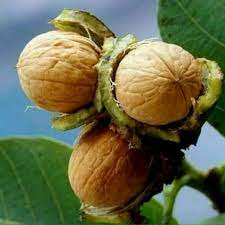Experts suggest steps to boost walnut production in India
PrashantNews
The experts have called for taking urgent steps to boost the walnut production in the Himalayan region of India due to its stagnant growth in the past one decade.
Impacted by the stagnation and the quality constraints, the demand of walnuts has shot up considerably in India mainly due to their immense health benefits, they said.
Juglans regia is one of the important nut crops of India being exported to many countries with having trade of more than Rs. 4000 crores annually. It is grown mainly in Jammu and Kashmir, Uttarakhand, Himachal Pradesh and Arunachal Pradesh. More than 95 percent of walnut plantations in India are of seedling origin and are being grown since ancient time. Being a cross pollinated crop each growing plant in walnut is a different genotype. The varieties grown in India are mostly selected from indigenous material.
“The productivity of walnut is very less because of lack of proper walnut plantations of high yielding cultivars and dwarfing root stock, non-responsiveness to the pruning, non-availability of easy clonal propagation techniques and production technologies which makes it difficult to improve the yield and quality of walnut,” said Navin Nainwal, an expert in the horticulture sector.
However, Jammu and Kashmir is the major walnut producing UT in India which produces 90 percent of walnuts. There is very high variability and slow growth in acreage and production as well as in yield-per-hectare of the walnut crop. In the Kashmir valley, the major walnut producing districts are Anantnag, Kulgam, Kupwara, Shopian, Baramulla, Pulwama, and in Jammu region the major districts are Doda, Reasi, Rajouri, Kishtwar, Kathua, Udhampur, and Ramban. The Kashmir Valley produces 60 percent of walnuts while the rest comes from the Jammu region. However, the growth rate in production, as well as acreage under the walnut cultivation, is growing faster in Jammu as compared to Kashmir.
The export of walnut from Jammu & Kashmir to other countries is over 85 percent, which is substantial for its agricultural economy. The Walnut industry, thus, provides excellent opportunities to the farmers in the Union Territory without the application of fertilizers and chemicals. The major three districts i.e. Anantnag, Shopian, and Kulgam only produce nearly 55 percent of the total walnuts in Jammu and Kashmir. These three districts itself gives an idea to analyse the growth, as well as identify the issues in the walnut industry of the country. Batmallu is one of the biggest markets in Jammu & Kahmir where 60% of the walnut crop is sold, with some other unregulated local district markets as well.
The past trends witnessed an actual reduction in walnut production as the walnut trees have faced continued degradation, unavailability of grafted walnut plants and absence of effective policies. The present data compiled by State Department of Horticulture and the National Horticulture Board may need verification and authentication through some study and survey to create an exact data base for perfect planning, Nainwal said. The GAIN report and other export and import report says only 36000 MT of walnut production is available in the country and the import is approximately little above 42000 MT in the past one decade.
On the other hand, the consumption of walnut is presently 85000 MT which is expected to increase 95000-100000 MT by the year 2025. For the walnut planting material, the private traders and nurseries are trying to import cheaper walnut plants from Turkey but due to unawareness about the techniques, and plant quarantine rules, poor logistic facilities and lack of transfer of technology at the farmers level, there is significant mortalities of imported plants.
As per the custom data about 1.10 lakh walnut plants were imported from the year 2018 to 2023 through 11 different consignments, seven times the import has been done by three private companies and four times by three government departments. From these eleven-import consignments, seven has been imported from Turkey with 102056 numbers of walnut plants. “It’s very important to know where those have been planted, there must be verification and authentication of plantation through geo-tagging”, Nainwal said.
The desire for walnuts in India has been growing very steadily, year after year, as more people understand the health benefits. It’s time to establish initially two Pilot, Centre of Excellence for walnuts one in north Himalayan region in Jammu & Kashmir and one in north eastern region in Arunachal Pradesh where Nursery and Processing could be taken up by the private sector and the research and development by the University/Institute.

